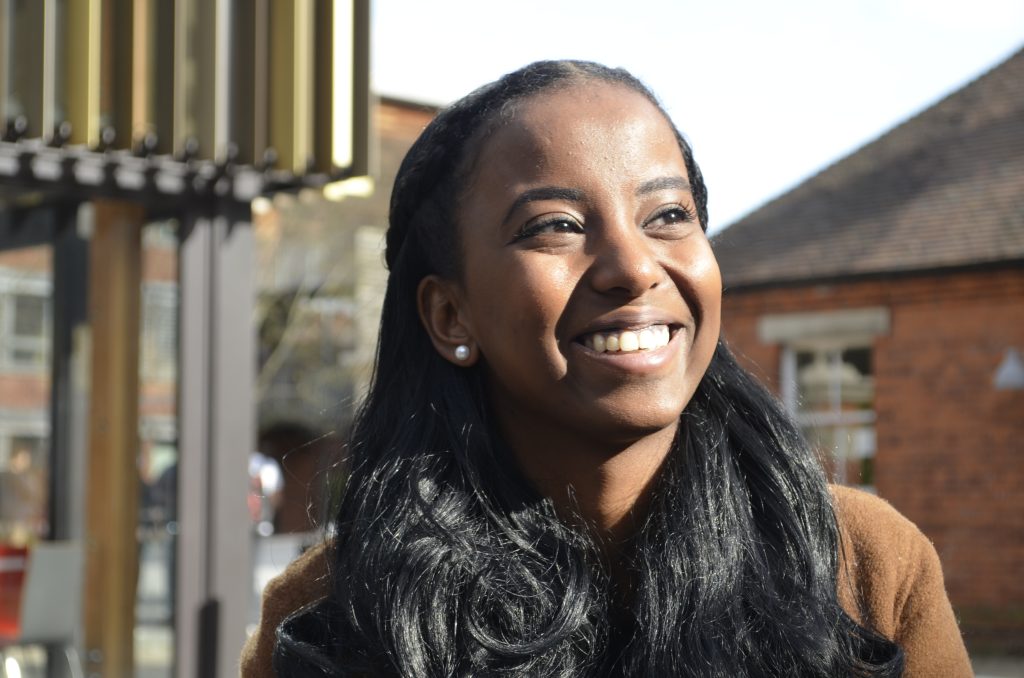
Hi Hanan, Could you tell me a bit more about your society and what it stands for?
We were founded in 2015 and what we wanted to do was to address intersectionality more on campus. We really have focus not just on women, but particularly women of colour. So we’re doing a lot campaigns for Black History Month and big events like ‘Why is My Curriculum so White’. We’ll be sort of arguing the case against exactly that. We also look at the other marginalised groups and campaigns that focus on Muslim women and female genital mutilation – things that don’t necessarily get that much coverage.
Is your society inclusive of people that aren’t women of colour?
Yeah, it’s definitely inclusive of everyone. We’re here for men, women, white people, people of other ethnicities; everyone.
Okay so, big question, what does Black History Month mean to you?
So I think Black History Month to me is an opportunity to understand that in Britain, there has been an uphill battle for civil rights and I think it took a really long time for all people to recognise that. From the Magna Carta all the way to the late 60’s, we have not had it easy. And I think that this month is about recognising people who have done great things despite adversity.
Do you think it’s still important to commemorate and celebrate it? I’ve heard people say Black History Month is good, but it’s only one month so what happens in all the other months of the year?
I don’t know – that’s a big question. I think there is definitely the case of saying that no one month should be dedicated to anyone. But it’s the same for International Women’s day and Women’s month.
I think, in an ideal world, Black History Month would be every day, where it is integrated into our education and everyday lives. But it isn’t. So, until we accept and integrate black history into British history, I think we will still need a month.
What do you think the general reactions and responses are to Black History Month on campus?
People on campus have a really interesting relationship with Black History Month. The University of Kent had Zayn Malik and Sadiq Khan as the figureheads for Black History which I think is really stupid because they aren’t black. I think that there’s almost a predisposition where people want to put all people of colour into a box. Obviously, Sadiq Khan doesn’t speak for black people, and black people don’t speak for Sadiq Khan. We’re both people of colour but we aren’t the same.
I definitely agree with you there. How do you think Black History Month will or can be moved forward?
I think it was only recently that people realised the significance of people like Nelson Mandela, but there are still loads of hidden figures like Paul Stevenson who, in the 60s, led a revolution against a Bristol bass company for not hiring black and Asian people. There are so many other people who have done things that aren’t recognised.
Final question, in terms of Black History Month: Do you feel like you’ve always known a lot about it or is it just something you’re a lot more clued into now that you’re older?
I think it’s definitely not something I’ve always understood. Since I’ve become older I’ve definitely understood or am beginning to understand the significance of everything. The society (Women’s of Colour Collective) has really helped me with feeling like it’s okay to take pride in your history and culture which I didn’t really do when I was younger. I was very ashamed of where I grew up and how I grew up. But not anymore! •
What does Black History Month mean to you?
Olaoluwa Olupona, President of African and Carribean Society (ACS) responds:
For me, Black History Month represents an opportunity to highlight historical figures past and present. In recent years, I have seen the focus on that month shift as I have gone through secondary school to university. The stories of Martin Luther King and Rosa Parks were drilled into us all at a young age but, as I grew older, I understood their true significance. In the current times of racial discrimination, we highlight such people in helping shape America in the past. But there are black Britons whose success and history can sometimes be overlooked. From Olaudah Equiano to Skepta, the list can go on. For me, this month helps me to feel proud of all the things black people have done universally.
